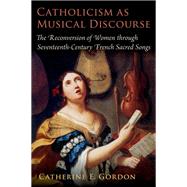
Catholicism as Musical Discourse The Reconversion of Women through Seventeenth-Century French Sacred Songs
by Gordon, Catherine E.Buy New
Rent Textbook
Rent Digital
Used Textbook
We're Sorry
Sold Out
Summary
Through an analysis of the musical repertory over time, Catholicism as Musical Discourse demonstrates how transformations within the church were linked to religious, political, and social and cultural trends, including the wars of religion, the fight against libertinism, Louis XIV's relationship with the church, the need to convert lay women to a life of piety, the condemnation of mysticism, the rise and fall of Jansenism, the need for female educational institutions, and an increasing public interest in connecting religious devotion with pleasurable entertainments. Although the songs' styles and lyrics changed over time, the power of music as one of the most important discursive modes of communication during the Catholic Reform remained the same.
Author Biography
Table of Contents
Notes on Quotations, Translations, and Music Examples
1. Introduction: Women, Sacred Songs, and the Catholic Reform
2. Discursive Parameters in Sacred Songs (1600--1650)
3. Mysticism and Jean-Joseph Surin's Cantiques spirituels: The Language of God and the Songs of Paradise
4. François Berthod's Airs de dévotion for Honnêtes Femmes, Novitiates, and Nuns
5. Bertrand de Bacilly: Les Airs Spirituels and Seventeenth-Century Rigorism
6. Bertrand de Bacilly's Airs Spirituels and the Musical Education of Girls
7. Sacred Songs, Pleasure, and the Triumph of Popular Taste
Conclusion: Feminism in Context: An Interpretation
Index
An electronic version of this book is available through VitalSource.
This book is viewable on PC, Mac, iPhone, iPad, iPod Touch, and most smartphones.
By purchasing, you will be able to view this book online, as well as download it, for the chosen number of days.
Digital License
You are licensing a digital product for a set duration. Durations are set forth in the product description, with "Lifetime" typically meaning five (5) years of online access and permanent download to a supported device. All licenses are non-transferable.
More details can be found here.
A downloadable version of this book is available through the eCampus Reader or compatible Adobe readers.
Applications are available on iOS, Android, PC, Mac, and Windows Mobile platforms.
Please view the compatibility matrix prior to purchase.
